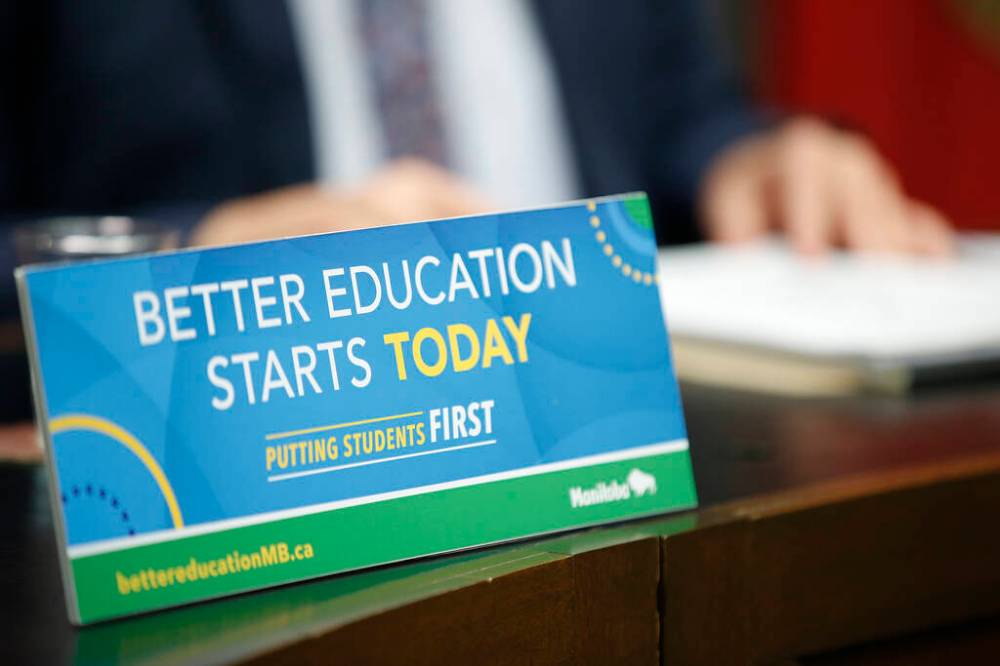Education department caught flat-footed by pandemic, rallied: AG report
Advertisement
Read this article for free:
or
Already have an account? Log in here »
To continue reading, please subscribe:
Monthly Digital Subscription
$0 for the first 4 weeks*
- Enjoy unlimited reading on winnipegfreepress.com
- Read the E-Edition, our digital replica newspaper
- Access News Break, our award-winning app
- Play interactive puzzles
*No charge for 4 weeks then price increases to the regular rate of $19.00 plus GST every four weeks. Offer available to new and qualified returning subscribers only. Cancel any time.
Monthly Digital Subscription
$4.75/week*
- Enjoy unlimited reading on winnipegfreepress.com
- Read the E-Edition, our digital replica newspaper
- Access News Break, our award-winning app
- Play interactive puzzles
*Billed as $19 plus GST every four weeks. Cancel any time.
To continue reading, please subscribe:
Add Free Press access to your Brandon Sun subscription for only an additional
$1 for the first 4 weeks*
*Your next subscription payment will increase by $1.00 and you will be charged $16.99 plus GST for four weeks. After four weeks, your payment will increase to $23.99 plus GST every four weeks.
Read unlimited articles for free today:
or
Already have an account? Log in here »
Hey there, time traveller!
This article was published 07/04/2022 (1342 days ago), so information in it may no longer be current.
Manitoba’s education department was unprepared for the COVID-19 pandemic due to not having an emergency management program or proactive co-ordination with K-12 leaders, the auditor general has found.
In a new report evaluating provincial leadership in managing pandemic operations across the school system, Tyson Shtykalo concluded the government may not have been prepared — but it still “effectively led” a response.
“Emergency preparedness is an essential part of government operations and required under the Emergency Measures Act. We expected the department to be prepared for, and to lead, a system response to a province-wide emergency,” the auditor general wrote in a summary of his March 2022 report.

The 72-page document details both failures and successes related to overseeing the education of more than 200,000 students throughout two years of pandemic disruptions.
It includes a list of eight recommendations, including: regular assessments of risks, hazards and vulnerabilities of the school system; and the creation of plans to improve internet connectivity so online learning is accessible everywhere, among others, to avoid a repeat situation.
Despite bureaucrats identifying a pandemic as a possible scenario in 2007, the auditor general indicated the education department was not ready for COVID-19 when the first case was identified in Manitoba.
Shtykalo indicated there was neither an emergency management program nor co-ordinated emergency plan for schools, internal business continuity plans were outdated, and documents did not consider the consequences of remote learning.
Despite the above, he said the department initiated a timely response when it was clear normal learning operations would be impacted, created and maintained an incident management system, and consulted with stakeholders to identify risks so the pandemic response was consistent.
“However, it lacked quality system-level data which made real-time planning and decision making difficult,” Shtykalo wrote.
The audit also found there was no provincewide data collection happening to identify long-term risks and impacts of the pandemic, while little work had been done when it came to recovery planning throughout the review period (January 2020 to February 2021).
In a prepared statement, Education Minister Wayne Ewasko called the ongoing pandemic “the most significant event the school system has ever experienced, both in Manitoba and around the world.”
“Ensuring that learning continues throughout the pandemic, while prioritizing safety and health, has been a priority of the government,” Ewasko said, noting the province was only recovering from the second wave in early 2021 when the auditor’s review wrapped up.
The minister said the province has invested in ventilation projects, personal protective equipment and mental health initiatives, following the research period.
The department will advance plans to address the report’s findings as it continues to undertake post-pandemic planning and work in partnership with public health officials, school divisions and schools, he added.
Political opponents were quick to condemn the province’s failure to be proactive.
“There was a complete lack of preparedness for the pandemic, which shouldn’t be a surprise,” Dougald Lamont, leader of the Manitoba Liberals, said during a scrum Thursday in which he suggested one of the success stories of the pandemic was the hard work of principals, teachers and superintendents to keep Manitoba children safe.
The impacts of the Tories’ failure to plan are being felt at present, NDP education critic Nello Altomare told reporters.
“There has to be a recognition that (young elementary) kids really need supports quickly and efficiently, without having to wait for a particular department report,” Altomare said. “We need to realize that and instead of react, plan for that so that we can move forward and get these kids school-prepared.”
— with files from Danielle Da Silva
maggie.macintosh@freepress.mb.ca
Twitter: @macintoshmaggie

Maggie Macintosh reports on education for the Winnipeg Free Press. Funding for the Free Press education reporter comes from the Government of Canada through the Local Journalism Initiative.
Our newsroom depends on a growing audience of readers to power our journalism. If you are not a paid reader, please consider becoming a subscriber.
Our newsroom depends on its audience of readers to power our journalism. Thank you for your support.


